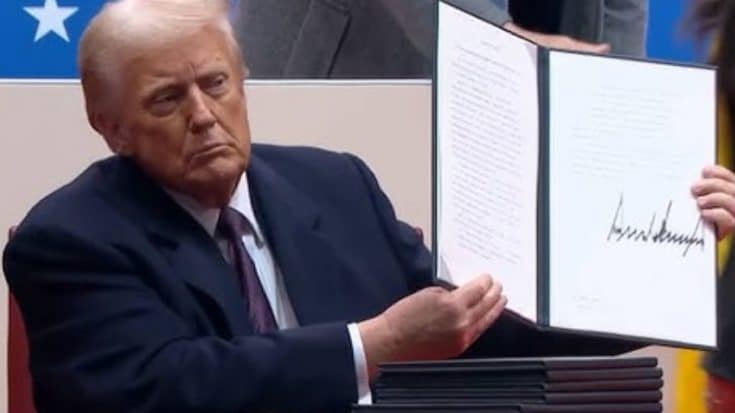Trump Signs Order to Halt Government Censorship and Defend Free Speech

via India Today / YouTube
President Donald Trump has issued an order to ensure that no federal official or employee limits the free speech of American citizens. This move aligns with his campaign promise to stop what he calls government “censorship” of U.S. citizens. The order was signed shortly after Trump began his second term and follows accusations from him and his supporters that social media platforms have been pressured by the government to remove valid posts because they worry about misinformation.
The order also directs the attorney general and heads of other executive agencies to look into actions taken during President Joe Biden’s administration that might have limited free speech. Based on their findings, they are to propose solutions to correct any issues.
On his first day back in office, Trump signed this order at Capital One Arena, expressing a strong desire to combat what he describes as the “censorship cartel.” This stance is popular with his supporters, many of whom believe the government has been unfairly targeting conservative voices.
Accusations and Impact on Government Agencies
Meta CEO Mark Zuckerberg has claimed that senior officials in the Biden administration pressured his employees to “censor” content during the COVID-19 pandemic. Similarly, Elon Musk, who owns the social platform X, has accused the FBI of forcing Twitter to suppress a story about Hunter Biden before he took over the company.
Former Twitter executives admitted they made a mistake by blocking the story just before the 2020 presidential election; however, they deny doing so because of government pressure. The Supreme Court, last year, supported the Biden administration in a case concerning the federal government’s power to manage disputed social media posts on topics like COVID-19 and election security.
View this post on Instagram
Trump’s order does not address the seriousness of harmful falsehoods online, which can lead to real-world threats and violence. In the past, his own false claims about the 2020 election led to threats against election officials and the assault on the U.S. Capitol.
It is not yet clear how Trump’s order might impact agencies responsible for monitoring false claims that could threaten election security, such as the FBI, the Office of the Director of National Intelligence, and the Cybersecurity and Infrastructure Security Agency (CISA). CISA, part of the Department of Homeland Security, has been criticized by Republicans for its work against misinformation. Kristi Noem, Trump’s choice to head DHS, stated in a Senate hearing that she would limit the agency’s work if that’s what lawmakers prefer.
Defending Efforts Against Disinformation and Trump’s Relationship with Tech Leaders
Outgoing CISA Director Jen Easterly defended her team’s efforts, asserting that the agency “does not censor, has never censored.” Nina Jankowicz, CEO of the American Sunlight Project, said Trump’s order is his way of seeking “vengeance for a slight that never happened.” Jankowicz, who led a federal Disinformation Governance Board under Biden that was shut down after conservative attacks, argued that the order helps foreign actors and others “who use disinformation as a tool to destabilize our country and profit from lies.”
View this post on Instagram
Trump’s order mainly concerns speech by Americans, and it is uncertain how it will affect federal communication with social media platforms regarding false information from abroad. Foreign misinformation campaigns have often targeted U.S. voters and been spread online by American citizens.
Trump has positioned himself as a defender of free expression since his first presidency when he criticized Twitter for adding fact-check labels to his tweets about mail-in ballots. Despite this, he often targets the press, labeling journalists as the “enemy of the people.” He has even suggested that he might try to retract broadcast licenses of certain TV news networks during his second term.
Although Trump has had issues with social media companies in the past, he seems to have grown closer to tech leaders like Elon Musk, Mark Zuckerberg, and Google CEO Sundar Pichai. These platforms play a big role in how Americans communicate today. Trump also took credit for TikTok’s continued presence in the U.S. and even invited TikTok CEO Shou Zi Chew to his swearing-in ceremony.













